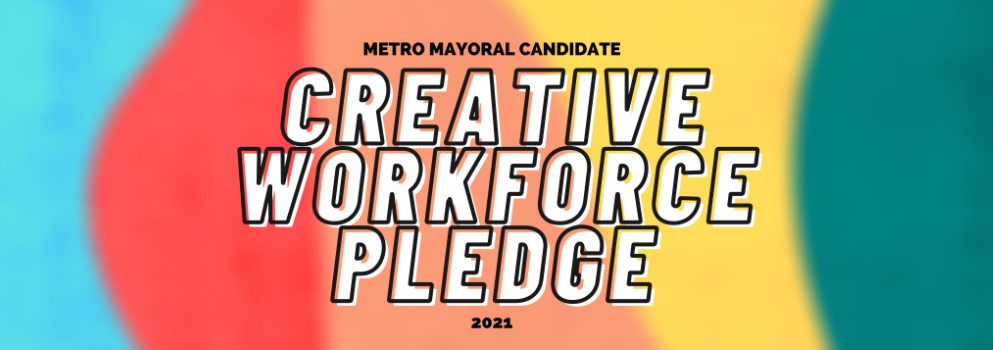On 6 May 2021 nearly 20 million people will elect their next Metro Mayor.
We believe that these powerful local leaders must stand up for the creative workforce, nurture local talent and invest in culture for all.
This past year we’ve been entertained by books, TV and radio broadcasts, box sets, films, computer games, music, journalism and digital streaming during the endless hours of lockdown. And many of us long to see live performances in our local theatres, on our streets, in concert halls, stadiums and festivals again.
But the workforce that makes this possible have had a devastating year, with many falling through the gaps in financial support schemes. We’re now seeing an exodus from creative professions.
That’s why the Federation of Entertainment Unions, of which WGGB is part, has joined forces with Culture Commons and Excluded UK to develop the Creative Workforce Pledge (see below), a list of 10 things we believe Metro Mayors need to do to protect the creative and cultural life of their areas.
Now we need you to ask your future Metro Mayor to sign it.
The Creative Workforce Pledge campaign tool is simple and quick to use: just fill in this short online form to find out if there are Metro Mayoral candidates in your area and to generate and send an email to them all asking them to sign up to the pledge.
THE CREATIVE WORKFORCE PLEDGE
If elected Metro Mayor, I will:
1. Creative Connections
Promote a digital network for talent in our area, supporting arts professionals to connect with creative and cultural businesses and organisations, strengthen relationships, promote their work, advertise job opportunities and showcase live performances and exhibitions. I will promote our incredible local talent across the country and the world with an annual awards ceremony that will celebrate the cultural diversity of our whole area.
2. Creative Entrepreneurs
Strengthen the skills of creative entrepreneurs by connecting up apprenticeships and training programmes for the arts, culture, heritage and libraries sector. I will work with partners to establish a workshop series for creative workers on financial skills, business development, employment rights and inclusive business practices. These will be delivered by industry specialists and reach out to young people, adults and under-represented groups who may never have engaged with these sectors before.
3. Culture Forum
Convene and chair a Culture Forum made up of representatives from local cultural organisations and creative businesses, industry networks and trade unions. I will listen to their ideas and integrate them into a cultural strategy to open these sectors up to all our communities, creating good quality jobs with industry standard terms and conditions. I will ask the Culture Forum to create a Freelancers Charter for our area.
4. Culture Works
Use the influence of the Metro Mayor’s office to support freelance creative workers to access equipment, technology and materials, helping to secure them at prices lower than they would be able to negotiate themselves. I will focus this work on supporting young people and those from disadvantaged backgrounds, where initial costs can be a huge barrier to entry into many creative professions.
5. Creative Regions
Make the case for investment in our creative and cultural sectors via the Levelling Up Fund, Shared Prosperity Fund and other centralised pots, to build the economic strength of our area and tackle regional inequality. I will call for the establishment of a creative and cultural sector working group on the “M10” network of Metro Mayors across the country to draw down these funds for local people.
6. Decentralising Decisions
Secure more local and regional involvement in decisions made by Government, the Arts Council, Heritage Lottery Fund, other lottery providers and the BBC. I will consult with the creative professionals and trade unions in our region when deciding how funds should be distributed. The workforce knows the rich cultural landscape of our area well, and must be involved in the curation and delivery of creative projects in the communities they live in as part of a more inclusive regional strategy.
7. A New Deal For Our Workforce
Ensure that all organisations and projects receiving local authority funding uphold industry standard terms where they exist. I will also use my platform to advocate for change nationally: the pandemic has highlighted the disproportionate and unsustainable level of precarity the creative and cultural industries workforce faces every day; I will stand up for them by calling for a national inquiry into the status of freelance and self-employed workers, as well as the establishment of a dedicated Minister in Government.
8. Cultural Communities
Involve communities in placemaking projects by establishing creative and cultural hubs in former retail, industrial or commercial facilities and empower creatives to innovate in these spaces. By supporting affordable studios, workshops and shared workspaces, helped by a progressive approach to business rates, we will attract leisure, retail and hospitality businesses and reinvigorate, diversify and renew deprived areas with vibrant, thriving communities.
9. Creative Education
Nurture the talent of local children and young people to ensure they can get in, and get on, in the creative and cultural industries. I will also strengthen provision for adults, so they can develop their skills and be resilient to changing employment. I will help put our areas unique voice on the national and international stage, working with partners to create a new system of local scouting and training, following the excellent examples of many of our football clubs, to find and develop the most diverse and outstanding locally grown talent.
10. Creative Crossovers
Establish a programme to help the creative workforce to stay connected to public services, health and wellbeing projects and business activities, building on the innovative ways of working they have discovered during the pandemic. I will ask cultural, heritage and sports organisations to consider social prescribing to provide our frontline healthcare workers and their patients with a rich resource of creative and outdoor activities to aid personal recovery.

